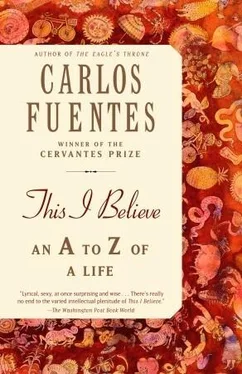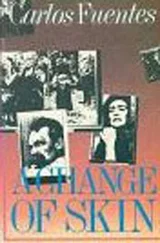Thanks to Judaism, thanks to Islam, late medieval Europe came to understand once again, and the Western world came to see once again. And we, their descendants, cannot subscribe to a “clash of civilizations” that negates half of our existence. History is ebb and flow; its nature is cyclical and the modern Western world would not exist were it not for the contributions of the Islamic world. As such, Islam’s current technical deficit can only be overcome by generously repaying the universal debt to the communities that live by the faith of Mohammed.
Islam and Judaism have given us all so much. Can we not reciprocate, in the first place, with a commitment to peace through the generosity of negotiation? And in the second place, by acknowledging the intrinsic and predominant humanity of the Arab nations, and by refusing to imprison them behind the intolerable bars of something synonymous with terror and blatant evil?
With this in mind I offer my political concerns for the new century.
I am concerned about the ruthless exploitation of our planet’s limited resources and by our assault upon air, water, and land.
I am concerned about the fact that by the year 2001 we were 6 billion men and women on this Earth: the greatest demographic leap in history, if you consider that when Christ was born the population was 300 million, and in 1900 it was 1.7 billion.
I am concerned that prejudice and exploitation, disguised as social order, continue to deny women — who account for more than half the world’s population — their basic rights to work, representation, and freedom.
I am concerned that the freedom of the markets will dominate and deny the freedom of labor.
I am concerned that the global economy encourages the free movement of goods and restricts the free movement of workers.
I am concerned that an authoritarian capitalist order with no totalitarian Communist enemy to battle will impose a single and dogmatic market model upon the world.
I am concerned about the return of the worst signs of fascism: xenophobia, racial discrimination, political and religious fundamentalism, and the persecution of the migrant laborer.
I am concerned that the drugs empire has created its own jurisdiction of impunity, above all national and international legal jurisdictions.
I am concerned about the deterioration of urban civilization right across the globe, from Boston to Birmingham to Bogotá to Brazzaville to Bangkok: the homeless, the indigent who must beg for subsistence, the disregard of our elderly, uncontrollable pandemics, insecurity, crime, the decline of health and education services. .
I am concerned about the resurgence of senseless arms races between poor neighbors for the benefit of wealthy neighbors.
I am concerned that for the first time in history human beings have the frightening capacity to commit suicide while murdering nature, whereas before the nuclear age, nature always survived our tragic madness.
I am concerned by the rise of unilateralism, which denies multilateralism as the only possible path to international cooperation.
I am concerned by the barbaric stance of preventive war, which denies diplomacy, conciliation, and constraint as instruments of international order and promotes suspicion between neighbors, an extension of the arms race, and deception on an international scale: where were Saddam’s weapons of mass destruction?
I am concerned by the diversion of the fight against terrorism to the selective overthrowing of tyrants if they happen to sit on barrels of oil.
I am concerned by the curtailment of freedom in the name of security.
I am concerned about a world without witnesses.
I am concerned about all that jeopardizes the continuity of life.
All of this is part of politics, of life in community, and of the citizenry in the polis.
In the figure of Don Quixote, Michel Foucault sees a symbol of the modern divorce between the word and the object. An emissary of the past, Don Quixote desperately searches for the place where the two may meet, as in the medieval order of things. The Quixotic pilgrimage is a search for similarities, and Foucault observes how Don Quixote rapidly recruits the weakest analogies: for him, everything is a latent sign that must be awakened to speak and to demonstrate the identity of words and objects: stocky peasant women are princesses, windmills are giants, inns are castles because such are the identities that words ascribe to objects in the books of Don Quixote.
But seeing as how flocks of sheep are really flocks of sheep and not armies, Don Quixote, orphan of the universe where words and objects no longer correspond, travels alone, the incarnation of the eternal dilemma of the modern novel that he inaugurates with his tale: How to achieve unity without sacrificing diversity? How to maintain the analogy damaged by impertinent humanistic curiosity as well as the difference threatened by the hunger for restored unity? How to fill the deep abyss between words and things through the divorce between analogy and difference?
Don Quixote contains both the question and the answer: the divorce between objects and words that previously corresponded cannot be fixed by a new setting or “placement” but rather by displacement. Set in his place by the static world of the knight errant, Don Quixote wants to destroy the paradox of an immobile adventure, prisoner to the old books in his library in the immutable village of La Mancha, and displace himself — that is, enter into movement. And that, in the age of antiquity, was how men distinguished themselves from gods: they displaced themselves. They moved. Don Quixote believes that he is traveling so that he may reestablish the unity of man and the faith that is his certainty, though in reality he travels only to find himself in a new physical space where everything has become a problem, beginning with the novel that Don Quixote inhabits.
The modern novel, a perpetual invitation to leave oneself and see oneself and the world as an unfinished problem, implies a kind of displacement similar to that of Don Quixote, although we may venture to say that no other novel — not even at its most experimental — has been able to propose displacements as radical as those of Cervantes. The radical displacement from purity to impurity and to the dissolution of genres, from classic narrative authority to the manifestation of multiple points of view, from the residual tradition of oral, tavern-oriented storytelling to the full Cervantine awareness that the novel is to be read by a reader and printed at a printing press, Don Quixote is a novel, to use the words of Claudio Guillén, that lives in “active dialogue” with itself. Its displacement of genres, authorities, and recipients of the verbal fact grant the novel an open destiny, forever unfinished, incessantly redefined: the novel is the art of displacement.
Don Quixote is the first modern novel, and its historical paradox is that it emerges from the Spanish Counter-Reformation, the Inquisition, the dogmas declaring purity of blood and Catholic orthodoxy. In the Spain that exiled half of itself when it expelled the Jews in 1492 and the Moors in 1603, Don Quixote is a paradox of the paradox. He is a reader of chivalric tales, a man who yearns to restore the medieval values of honor, justice, and courage, and to do this he leaves his home in the Castilian plain, mounted atop a feeble nag, accompanied by a plump little squire straddling a mule.
Don Quixote is a reader. But despite the nostalgia he feels for the Middle Ages, he is a modern reader who reads his books in printed form, thanks to the genius of the German editor Gutenberg. Mad about books, Don Quixote transforms his reading into madness and, possessed by both, wishes to take the things he reads about and turn them into reality. He wants to resuscitate a lost world, an ideal world. But when he leaves his village, he stumbles upon a world that is far from ideal, a world of bandits and chain gangs, goatherds, rogues, scullery maids of easy virtue, and unscrupulous innkeepers all too willing to ridicule him, batter him, and thrash him about in a blanket.
Читать дальше












